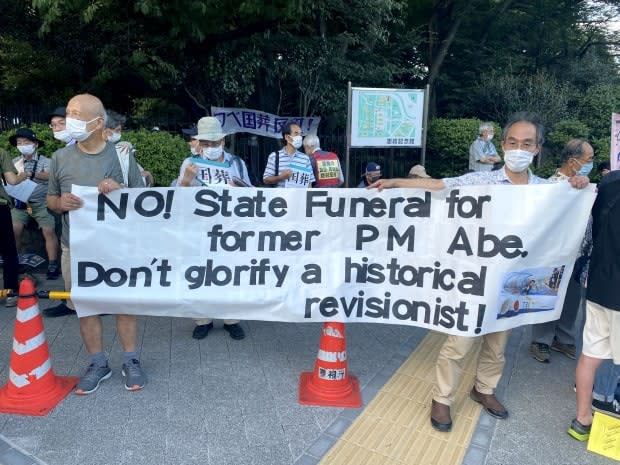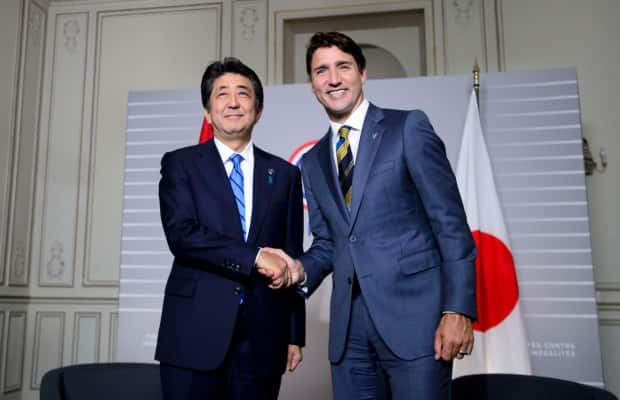Why many Japanese are protesting a state funeral for assassinated ex-PM Shinzo Abe

On a humid evening in central Tokyo, Takehiko Tsukushi is chanting.
"Stop the state funeral for Shinzo Abe!"
He's among thousands of protesters holding signs and lining the street across from Japan's parliament building, while listening to fiery speeches blaring from a makeshift stage.
"It's very wasteful," said Tsukushi, referring to the hefty price tag for the upcoming ceremony meant to honour the country's longest-serving yet deeply polarizing former leader.
"He was a liar and he destroyed Japanese society, you know? He should not be the object of a national funeral."
This noisy rally is one of many that have been held around Japan over the past two months, as the movement against a state ceremony for the assassinated ex-prime minister has gathered momentum.
A man shot and killed Abe with a homemade gun in July as he was giving an outdoor stump speech for another candidate during the national election campaign. His brazen murder shocked the country and led to an outpouring of grief around the world.
Support for state funeral evaporates
When Abe's family held a funeral service a week after his death, mourners crowded streets near the temple where it took place. But more than two months later, support for a larger public ceremony has significantly eroded.
WATCH | Reaction after ex-Japanese prime minister Shinzo Abe was assassinated:
The event on Sept. 27 would be the first such ceremony for a former Japanese leader in 55 years. Tokyo's Budokan arena is set to host 6,000 guests, including numerous foreign dignitaries.
However, Prime Minister Justin Trudeau announced on Saturday that he would no longer be attending after post-tropical storm Fiona struck Atlantic Canada.
Recent polls from Kyodo News and public broadcaster NHK suggest about 60 per cent of people in Japan do not approve of the funeral, with municipal assembly members and lawyers arguing there is no legal basis to hold one.
"I think he [Japanese Prime Minister Fumio Kishida] didn't really know which monster he was awakening from the grave when he agreed to this state funeral," said Koichi Nakano, a political science professor at Sophia University in Tokyo.
He spoke at the rally, and is among many Japanese academics critical of the decision to hold the event.

Nakano says many see it as an attempt by the Kishida government to appease Abe's supporters within his ruling Liberal Democratic Party (LDP), and cement the former leader's legacy.
He says critics also view the funeral's $16 million price tag, which includes security costs for hosting dignitaries, as an inappropriate use of taxpayer money.
"It's now increasingly looking like the Tokyo Olympics in terms of opposition by the people.
I think a lot of people feel like, OK, the government wants to do this for PR purposes, but why do we have to pay for this?"
Abe's complicated legacy
Outside Japan, Abe is remembered for his attempts to elevate Japan's global prominence.
He made 81 trips abroad during his almost nine years in power, an exceptional feat for a country otherwise known for its revolving door of prime ministers. Abe tried to strengthen relationships with Western leaders, including through a famous golf-buddy friendship with Donald Trump.
After his death, Trudeau called Abe a "dedicated, visionary leader and a close friend of Canada."

At home, however, Abe was considered one of the most divisive Japanese leaders in the postwar era.
He was credited with creating a sense of economic stability in Japan, and tried to jolt the country out of chronic deflation with his bold "Abenomics" policy, featuring easy lending and structural reforms.
On issues of national security, Abe was hawkish. He held a revisionist view of Japan's role in the Second World War and inflamed public anger by pushing to change his country's pacifist constitution to support a stronger military.
He was also dogged by cronyism scandals, even after he resigned in 2020 due to health issues.
Kishida, who served as foreign minister under Abe, has been facing growing calls to justify the need for a state-financed ceremony to honour the controversial former leader.
He said he decided to hold the event because of Abe's contributions to the country and his achievements at home and abroad.
"I humbly accept the criticism that my explanation was insufficient," Kishida told members of parliament on Sept. 8, in response to questions about the state funeral.
Controversial church links
Kishida's decision became more politically fraught since the alleged killer's motivations have come to light. Tetsuya Yamagami reportedly told police he killed Abe because of the former leader's apparent links to a South Korea-founded religious group known as the Unification Church. The 41-year-old said the group bankrupted his mother and ruined his life.
That shocking revelation kicked off investigations that uncovered ties between a significant number of ruling party lawmakers and the Unification Church, which some label a predatory cult.

Kishida vowed his party would cut ties with the group and removed seven ministers from his cabinet who disclosed connections. But the controversy has only widened, fanning the opposition to Abe's state ceremony and helping to drive the current cabinet's approval rating down to 40 per cent, the lowest since Kishida took office last year.
Masaru Kohno, a political science professor at Waseda University, believes the government might not have faced significant opposition if it had held Abe's funeral shortly after his death, when public sentiment against the brutality of his murder was running high. But Kohno says the tides have clearly turned.
"I think everyone was kind of prepared to say, 'OK, we'll mourn this occasion,' even though they were opposed to what [Abe] did and how he handled the many scandals he was allegedly involved in," said Kohno.
"However, because of this Unification Church problem, people started to recognize that maybe we should not put all of that behind us."


